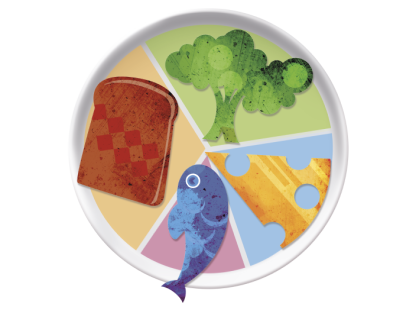Developed by the BNF’s team of nutrition scientists along with an advisory group of experts in early years nutrition, the 5532 guide outlines the balance of different foods that preschool children should be eating, and in what amounts, to help parents and carers choose a healthy, varied diet for their children. 5532 represents the number of portions across each food group young children should eat each day: 5 portions of starchy foods; 5 (or more) portions of fruit and vegetables; 3 portions of dairy foods; and 2 portions of protein foods (or 3 if a child is vegetarian).
The 5532 guide contains examples of a variety of foods within each food group. Because the guide covers ages 1-4 years, and young children’s appetites vary from day to day, a portion size range is given for most foods. Parents and carers can work within this to decide what best suits their child, for example: 3-6 tbsp breakfast cereal, 2-6 carrot sticks, 2-4 tbsp of beans or lentils.
Sara Stanner, Science Director, BNF says: “Establishing healthy eating habits from a young age helps to set a child up for good health later in life. Even when parents know which foods are part of a healthy diet, it can sometimes be difficult to know what sized portion is suitable for a young child, and how often they should be eating from the different food groups each day.”
The 5532 guide contains updated information on free sugars, highlighting that parents need to limit intake of sweetened versions of starchy foods, such as high sugar cereals, and should opt for unsweetened dairy foods, like plain yogurt, where possible. The resource also addresses confusion on the nutritional value of fruit juices, stating that “Fruit juice provides some nutrients but is also high in sugar and is acidic so, if consumed, should be diluted and kept to mealtimes”.
With the increasing popularity of vegetarianism and veganism, BNF has adapted the 5532 guide to provide specific information on these diets for young children. Among the advice, BNF recommends that vegetarian children should eat three portions of protein foods per day to ensure that they get enough of important nutrients such as iron and zinc. While well-planned vegetarian and vegan diets can be healthy for young children, for those considering a vegan diet, the BNF suggests visiting a GP to ask for advice about supplementation, as it can be difficult for young children to get enough vitamin A and B12, riboflavin, iron, zinc, calcium and iodine.
Stanner continues: “The latest updates to our 5532 guide help to address some of the biggest causes of confusion around nutrition for little ones. We know that many parents are very concerned about sugar, and our guide highlights that sugary drinks and sugary treats like biscuits, chocolate and sweets shouldn’t be a regular part of children’s diets. It’s a good idea to check food labels and to look for lower sugar options when choosing foods like breakfast cereals or yogurts. Likewise, families making the decision to adopt vegetarian or vegan diets need to be aware of how to balance their diet, and use supplements if needed in order to ensure children get all the nutrients they need to be healthy.”
As well as containing information on portion sizes, the 5532 guide contains nutrition and feeding advice for parents of preschool children, for example:
- Meal times: Try to have regular meal and snack times each day and include your child in family mealtimes when you can.
- Snacking: Offer your child a small, healthy snack like fruit, vegetable sticks or toast fingers with cream cheese, 2-3 times a day. This will allow an opportunity other than meal times to provide important nutrients.
- Variety: Children’s food preferences vary from day to day so keep offering your child new foods, alongside familiar favourites.
- Appetite: Most young children can regulate their own appetite so encourage them to eat but don’t force them or expect them to eat if they are not hungry.
- Milk: Milk is a good choice for drinks as it provides calcium and other important nutrients. Children aged 1-2 years should have whole milk, which is a good source of vitamin A. Those eating well can be given semi-skimmed milk after 2 years. Skimmed or 1% milk is not suitable as a main drink for children under 5.
- Salt: Limit the amount of salty foods your child eats and be aware of some foods containing added salt. Your child should eat no more than 2g of salt per day – a packet of crisps contains around 0.3g of salt, a slice of ham contains 0.3gm, and 2 tbsp of standard baked beans contains around 0.5g.
- Physical activity: Encourage your child to be physically active for at least 3 hours over the day – this could be any kind of movement including rolling and playing on the floor, playing in the park or dancing. Also try and avoid your child sitting still for too long e.g. in buggies or watching TV.
Other new information contained in the BNF guide includes further advice on breastfeeding, and updated food group names in line with the most recent Eatwell Guide. The 5532 resources are free to download online here and printed copies are also available from the BNF shop.


















